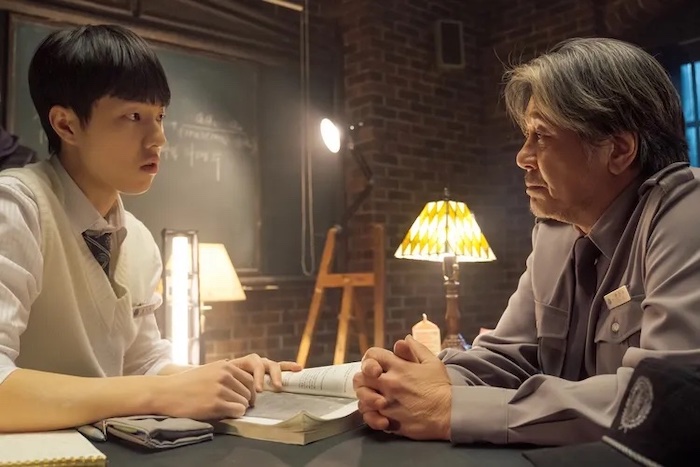
Ever since his lead performance in Oldboy, Choi Min-sik has come to represent, at least to international movie fans whose diet of Korean films tend to center on well-known fare, the Korean idea of the antihero: a deeply flawed individual who is made to pay for his sins in extreme ways and, for better or worse, is redeemed by this process—even if Choi’s filmography reveals a wider range of characters. Given the Korean predilection for revenge tales and purple melodrama, Choi took this kind of persona to the bank, but in his twilight years he’s turned into something else, a kind of post-redemption figure who wears his victimhood like a badge. In his latest film he plays a North Korean defector who lays low by working as a night watchman at a prestigious prep school. As it turns out, his desire to cut a modest figure is multivalent, and it’s the viewer’s desire to learn what made him such a hermit that gives the story its potent appeal, because otherwise the movie does nothing new or interesting.
The protagonist is actually a student, Ji-woo (Kim Dong-hwi), who is attending as a “welfare case,” meaning an honors student who can’t afford such a school because of his socioeconomic situation (widowed mother without education). Painfully aware of his circumstances, he’s not so much bullied as given the opportunity, usually against his will, to prove his worth, and one night while smuggling in booze for his dorm mates, he’s caught by the night watchman, Hak-sung (Choi), who reports him to the school. The punishment is loss of dorm privileges for a few months and, embarrassed to go home, he endeavors to sleep in one of the school’s abandoned classrooms, where, of course, he encounters Hak-sung again. As it turns out, the night watchman was once a storied math prodigy, and Ji-woo can’t afford the kind of math tutors his classmates patronize. Once he understands Ji-woo’s special status, Hak-sung agrees to teach him advanced calculus under certain conditions, which mostly boil down to not giving a fig about tests and scores and applying oneself to the study of math as if it were a sacred calling.
Aside from Hak-sung’s philosophical diatribes about the real meaning of numbers, most of the development in the first half of the movie adheres to the kind of action prerogatives you see in sports films, but once his true motivations come out, the story takes on multiple meanings and deepens its critical interrogation of not only Korea’s warped education system, but also the fraught, unknowable emotional and logistical difficulties that communist defectors have to navigate in order to just survive in South Korea. The screenplay is clever even if it relies too heavily on big, obvious reveals and changes in tone that feel phony—the scene where Hak-sung and a female student play what sounds like a K-pop tune on a piano that is supposedly based on a numerical extrapolation of pi is sublimely ludicrous. What saves it is Choi’s indelible projection of a grizzled survivor of moral misadventure.
In Korean. Now playing in Tokyo at Cinemart Shinjuku (03-5369-2831).
In Our Prime home page in Japanese
photo (c) 2022 showbox and Joyrabbit Inc.
